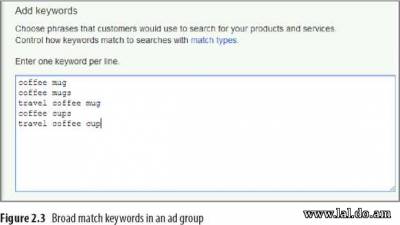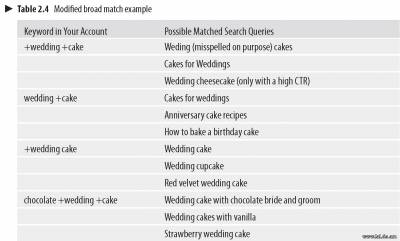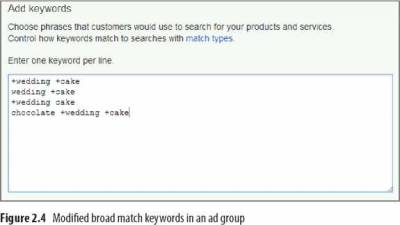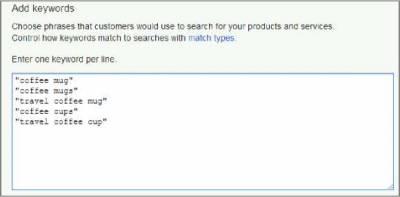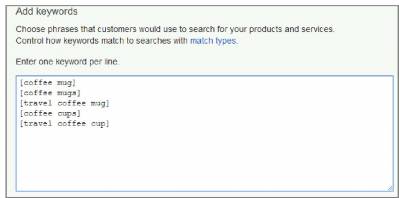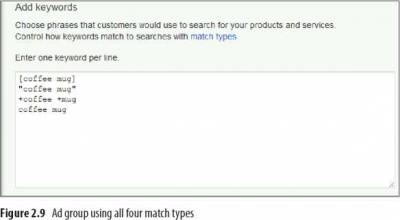Discerning Keyword Match Types
AdWords gives an advertiser a significant amount of control in determining when an ad will be shown. We will continue to discuss many of these additional options in later chapters. However, keep in mind that if you do not match your keywords appropriately, these additional controls will only have marginal increases in producing high-quality traffic. There are four match types that AdWords uses to determine whether your ad should be displayed based on the user’s search query: broad, modified broad, phrase, and exact match. These are also referred to as positive match types because they define when your keywords will be allowed to match against a user search query to display your ad. There is a fifth match type, negative match, which does the opposite. It prevents your ads from being shown when your negative keyword is present in the user query. We’ll start with the four positive match types. Broad Match Broad match keywords can trigger your ad to show if the searcher uses a query that is related to your keywords. Broad match keywords match to misspellings, plurals, and even similar words. For example, if you had the broad match keyword coffee cups, you could match to coffee cup (singular), cofee cup (misspelling), or coffee mug (similar word). In addition, the order of the words does not matter. To continue our example, if you used the broad match coffee cups, you could match to cups coffee or mug coffee. You can be matched if the search query contains similar words to your keyword with additional parameters. For example, if your keyword was coffee cups, you could match to coffee red mug, blue mugs coffee, or coffee cup holder. Lastly, when you use broad match, your keywords can be matched within a search session to a completely different query. For instance, if someone searches for coffee cups, looks at the results, and then searches for a coffee maker, your coffee cups keyword could be triggered to show an ad because the user has not ended that search session. If you sell only coffee mugs, being matched to a keyword such as coffee cup holder is probably not a good match. In these cases, we will show you how to keep your ad from showing when we visit negative keywords later in the section “Using Negative Match.” The biggest problem with broad match is that you are matched to “similar” items and you don’t get to define similar—Google does. This leads to a lot of queries triggering your broad match keywords that are not relevant to your business. In addition, the higher your CTR, the broader the search queries that could trigger your ads. For instance, if you had a good CTR on the term coffee mugs in broad match, you might show for the search query tea cups. If you did happen to also sell tea cups, you should have a different ad copy and landing page for that keyword than for the keyword coffee mug. So while you will often match to these additional queries, sometimes these clicks will not turn into sales because of the irrelevant ads and landing pages. However, there is an advantage to broad match: not having to find all the possible variations of keywords. In a November 2008 article, Google announced: Did you know that 20% of the queries Google receives each day are ones we haven’t seen in at least 90 days, if at all? http://adwords.blogspot.com/2008/11/reach-more-customers-with-broad-match.html Google restated this number privately in 2011 and in 2013, but it even went further: 20 percent of queries Google receives each day are ones they had not seen in the last six months, if at all. As more search queries occur, the number of possible keyword combinations is also growing. When one-fifth of all searches on Google have not been seen by Google in the last six months, and that engine receives billions of queries each month, it is easy to see that it is impossible to have every single keyword related to your products or services within your account. The problem of marketers wanting to use broad match to reach all of the possible queries and yet maintain some control finally manifested itself in a new match type: modified broad match.
Modified Broad Match If you examine your keyword phrases, usually there are one to three words that really matter in the phrase, and the other words are modifiers that do not mean as much to your conversion rates. For instance, if you take the query Size 9 red Nike shoes, you would want to make sure the words Nike and shoes are in the query, but the size or the color might not matter. With modified broad match you can signal to Google that only the words Nike and shoes are important and the search query should be closely related to those two words, but the rest of the words in your keyword phrase can be treated with more liberal matching. To tell Google what words are important, you just put a plus (+) sign in front of the most important ones. The words with the plus sign can still match to plurals, misspellings, and very similar words, but they should not match to completely different types of words. With modified broad match, the ordering of the words does not matter, just as with broad match. Let’s look at a few examples of modified broad match with a different main search query, wedding cakes (see Table 2.4). In each instance, a word very related to the keywords with the plus sign was in the search query—but plural, singular, or misspelled versions of the word did not matter. Inside Google’s interface, you will still see modified broad match words listed as broad match. There is no modified broad match type in the interface. The fact that you have added a plus sign to the word makes it modified broad match (Figure 2.4). If you want to maintain some control but do not want to have research every variation of possible words, modified broad match is an excellent place to start when you add keywords to your account. Please note, you do not have to add every single modified broad match combination in your ad groups. I have seen accounts where the keyword lists look like this:
In this case, you need to determine if red matters to you. If it does not, then you can use the keyword variation red +wedding +cake. If the word red does matter, than you can use the variation +red +wedding +cake.
When Should You Use Broad Match? Because modified broad match gives you so much control, there are only a few reasons to use the standard broad match type. One of the best uses of broad match is to buy research. With broad match, you can match to many queries, and search queries will give you excellent insight into search behavior. So, if you think of broad match as buying search data and not as keywords that you need to prove ROI, broad match can be very useful. Another reason to try broad match is when there are very few queries for the account. If you are trying to serve ads into a very small geography or are in a very niche business, you might try using some broad match to increase your total impressions and clicks; just make sure they are helping you reach your overall marketing goals.
Phrase Match A keyword is considered “phrase matched” when you enter the word in an ad group within quotation marks, as seen in Figure 2.5. Figure 2.5 Phrase match keywords in an ad group In order for your phrase match keyword to display your ad, the search query must contain your keyword in the same order you typed it into your ad group. For example, if your keyword was coffee cups, your keyword would match to phrases such as the following:
In each of these instances, there could be words before, after, or before and after your keyword. It could also be the keyword phrase itself. However, your keyword was always included in the search query. Phrase match keywords do match to misspellings or plurals unless you disable this function, which will be addressed in the “Variation Match” section. Therefore, if you have the keyword coffee cups, the following searches would trigger your ad:
Your ad would not trigger if someone entered a word in the middle of your keyword, between the words coffee and cup. In the coffee cups example, if someone searched for coffee blue cups, your ad would not show because the search query did not contain your phrase exactly. Just to clarify, the user is not typing in quotes or adding formatting when entering their query into Google. The user is searching as usual; the quotes are only used to signal to Google that you would like your keyword to be triggered if it matches the search pattern. For example, in Figure 2.6, if you had the phrase match keyword coffee cup, your ad could be displayed. Figure 2.6 Google search query that will display an ad for coffee cup phrase match keyword Phrase match used to be one of the best match types to use for new accounts since it gave you a lot of control. However, with the introduction of modified broad match, many advertisers have been using phrase match much less. If you are using an automated bid system where the number of keywords under management does not necessarily mean it takes you more hours to manage your account, you should use phrase match. However, if you are managing accounts by hand, then using a mix of modified broad and exact match is a good way to start, and then you can apply phrase match for those special instances where modified broad match doesn’t give you the ad serving control you’d prefer. For example, if you are selling Pittsburgh Steelers (an NFL football team) gear and you add the keyword +Pittsburgh +Steelers Jerseys in your account, you might show for search queries such as the history of steel mining in Pittsburgh. Usually, NFL fans type in the name of their team in the same phrase over and over but with different modifiers on the gear. In this instance, using Pittsburgh Steelers Jerseys in phrase match could be a better option than modified broad match.
Exact Match Exact match is the most specific matching option that AdWords offers. First, you must enter the keywords into your ad group within brackets, as shown in Figure 2.7. Figure 2.7 Exact match keywords in an ad group Exact match works just how it sounds: A user must type into the search box a query that is identical to a keyword in your ad group for your ad to be displayed. Exact match keywords can match to misspellings, similar keywords, plurals, or singular forms of the words. If you have the exact match keyword [coffee cups], your ad would be shown if someone types in coffee cup (singular), or cofee cups (misspelling). However, if the user typed in blue coffee cups (additional word), or coffee mugs (similar word), then your exact match keyword will not trigger an ad to be displayed. The biggest advantage of exact match is that you know exactly what someone is typing into the search box. You can examine your ad copy, landing page, and keyword to ensure that a perfectly formed synergistic chain has been established that will maximize your conversion rate. In longer queries, exact match will also show user intent. A keyword such as buy plasma TV shows commercial intent. A keyword search such as LCD vs. plasma TV or advantages of accountants over tax prep software signals a comparison-shopping intent. In this case, users need more information before they are ready to buy a product. A search such as congressional term lengths has an informational intent. While we all use a search engine to find answers to questions, our intent upon finding those answers can vary quite significantly. The main intents online are commercial, informational, and navigational. However, just because you have a shopping site does not mean you should not use informational terms in your keyword list. It means you need to make sure you are engaging those users first with information and then have that information lead them to your products.
Variation Match While exact and phrase matches can show for plurals and misspellings, there is a way to disable this behavior in your account so that you know exactly what will trigger your ad. There is an option inside AdWords that can cause these two match types to not show for misspellings and plural versions known as near match or variation match (Figure 2.8). Figure 2.8 Exact and phrase match options This is a campaign-level setting, so it will apply only to the keywords in that particular campaign. To understand whether this setting is good for you to employ, you need to take a look at your data to see whether you have drastic changes in your conversion rates, cost per conversion, or average sale amount by keyword variation. For instance, there is a wholesaler of restaurant clogs that finds that when a user searches for restaurant clogs their average order value is $562. If a user searches for restaurant clog (singular) their average order value is $97. Since their average order value is so different by singular and plural terms, they would not want to use this setting because they are willing to bid much higher for the plural version of the keyword than the singular version. Conversely, there is an electronics retailer that finds their conversion rate, average order value, and cost per acquisition is the same for the terms Plasma TV (singular), Plasa TV (misspelling), and Plasma TVs (plural) and therefore this setting is useful for them to employ. When you first open an account, you will not have the data to determine if this is a good or bad setting, so let your budget decide for you. If you cannot reach your daily budgets, then leave this feature on so that you will receive more impressions and gather the data to decide. If you do not have the budget to buy all the possible impressions, then it can be good to turn this option off until you have the budget to experiment with showing for more word variations.
Which Match Type Is Best? Now that you know the four positive match types, how should you use them within your AdWords account? First, you should know you can use all four positive match types for the same keyword within the same AdWords account or campaign. You could have the same keyword exact, phrase, modified broad, and broad match within the same ad group. Second, when determining which match types to use, there are two major considerations: budget and reach. If you are starting with a small budget and only want to increase your budget as you find profitable keywords, you will want to start with mostly exact match keywords and maybe some modified broad match. Once you find keywords that are meeting your business goals, then you can add the phrase match or modified broad match versions of those keywords. If you are starting with a large budget and are willing to throw everything at the wall to see what converts, you will want to start with mostly modified broad match or broad match keywords. If you have a large budget but want some control, then start with mostly modified broad match. If you want lots of data to work with and are willing to pay for some clicks that will be irrelevant, then use broad match. As you find keywords that convert, add those words as exact and phrase match words over time. You can also start with all four match types if you want. This is useful for adding the branded terms in mostly exact and phrase match, and then adding the two- to three-word keywords as modified broad and phrase match, and adding the four-word and longer keywords in modified and some broad match versions. If you have multiple match types, make sure that you have exact match bid the highest, phrase match a little lower, modified broad even lower, and finally broad match at the lowest bid. The reason why you want to set bids will become apparent in Chapter 7, “Demystifying Quality Score.” Essentially, if all four keywords can be triggered in a single search result, Google will show the one with the highest ad rank. Ad rank is a number derived from multiplying your Quality Score by your maximum CPC (cost per click). By bidding the most on exact match, you are forcing a higher ad rank for the exact match than the phrase or broad match keyword. Another reason you would want to bid exact match the highest is that you know exactly the keywords used in the search query. It is much easier to determine user intent with exact match words than with the other match types. With phrase or broad match, the search query should be related to your keywords, but it may not be your actual keywords. You should find that exact match has the highest conversion rate, then phrase match, then broad match. If you find that broad match has a higher conversion rate than phrase or exact match, it is generally because you are being matched to some search queries where you do not have that corresponding keyword in your account, and those queries have higher conversion rates than your account’s keywords—which then causes the broad match keywords to appear to have higher conversion rates. You can use the search query report (detailed in Chapter 16, “AdWords Reports: Extracting Actionable Information”) to see some of the actual search queries that were used by searchers to trigger your keywords to show ads. Lastly, if you make sure that your exact match is bid higher than your phrase match, and that your phrase match is bid higher than your broad match, every time your phrase or broad match keyword is shown, it’s highly likely that you do not have that exact match keyword in your account. Because of the number of unique queries seen on Google within a day, you will never have every exact match keyword in your account. It is just not possible to find every single variation. This brings us to the second point to consider when using multiple match types: reach. Broad, modified broad, and phrase match will help you reach a larger user base. If you only have exact match keywords, you are considerably lowering the possible search queries that your keywords could be matched to and thus will not reach nearly as many users. By examining both your budget and desired reach, you can determine how many different match types you wish to use when creating a new ad group (Figure 2.9). Once an ad group starts to collect statistics, you can use the search terms report to determine what keywords you wish to add to your ad group and what keywords you do not wish to trigger your ad. As a starting point guideline, bid phrase match 15 percent less than your exact match bid, and bid modified broad match another 15-25 percent less than your phrase match bid. If you want to buy some research or more impressions through the use of broad match, bid that another 15-25 percent lower than modified broad match.
© Advanced Google Adwords: 3rd edition >>> Back to TABLE OF CONTENTS <<< | |
| Views: 598 | |
| Total comments: 0 | |
